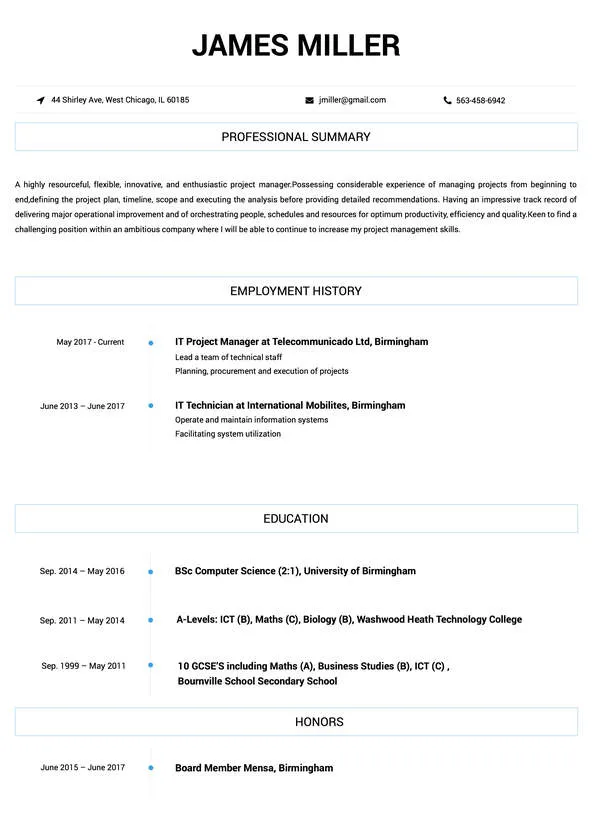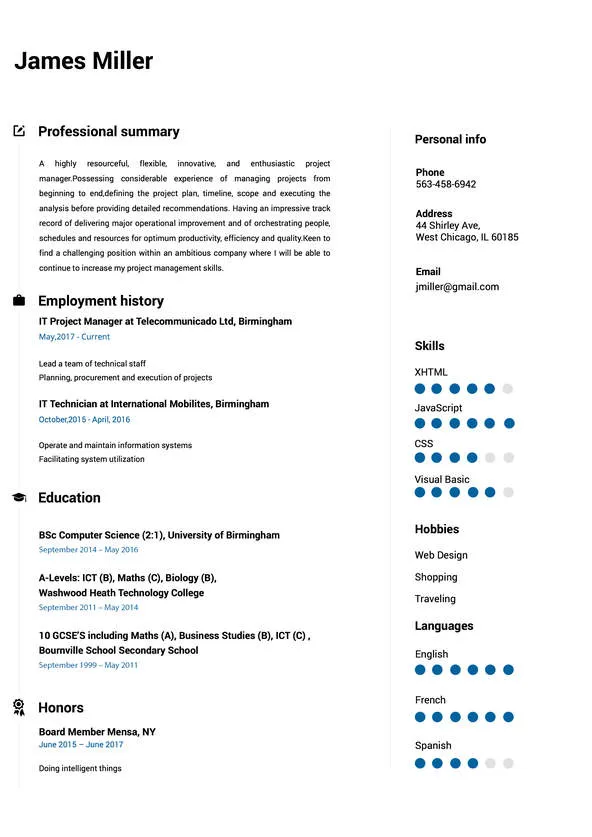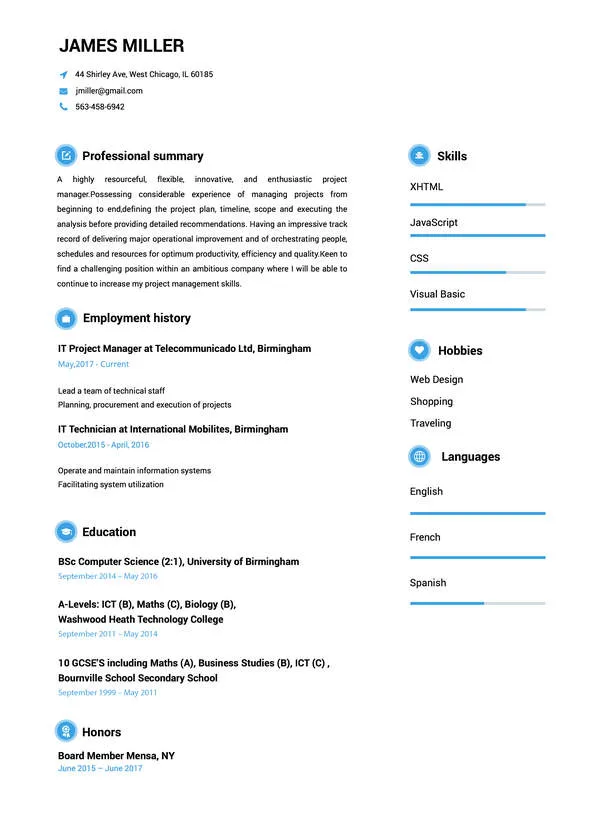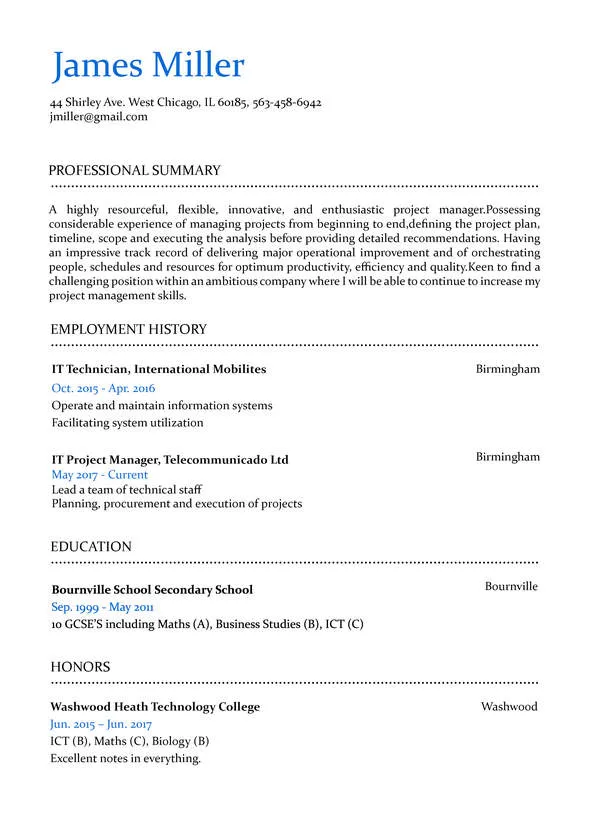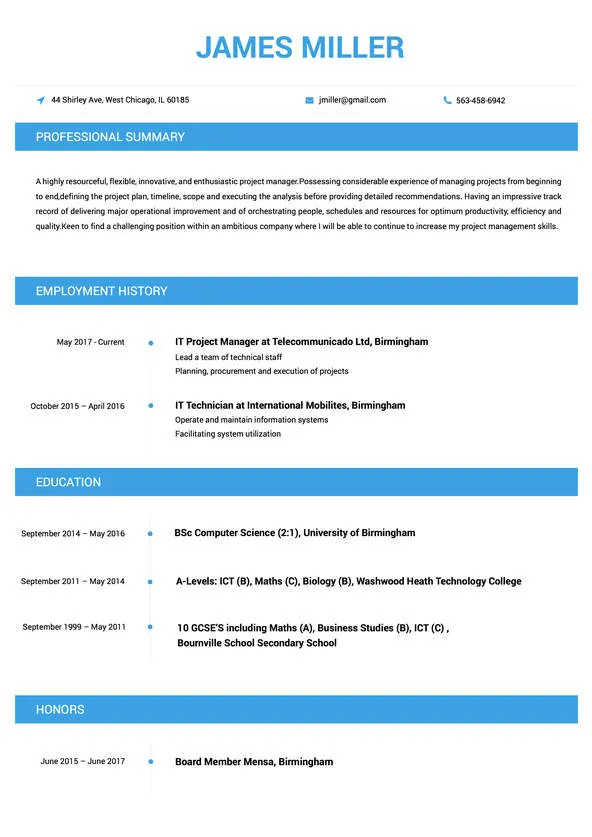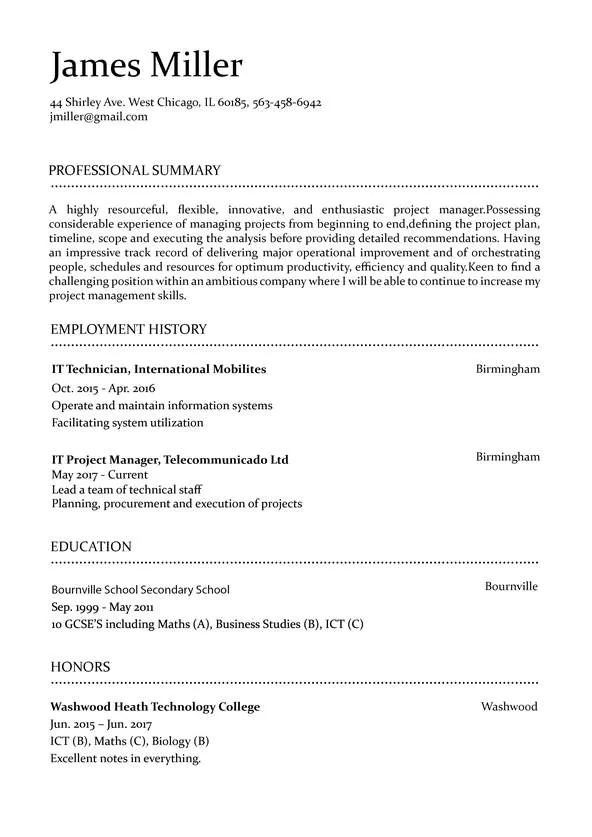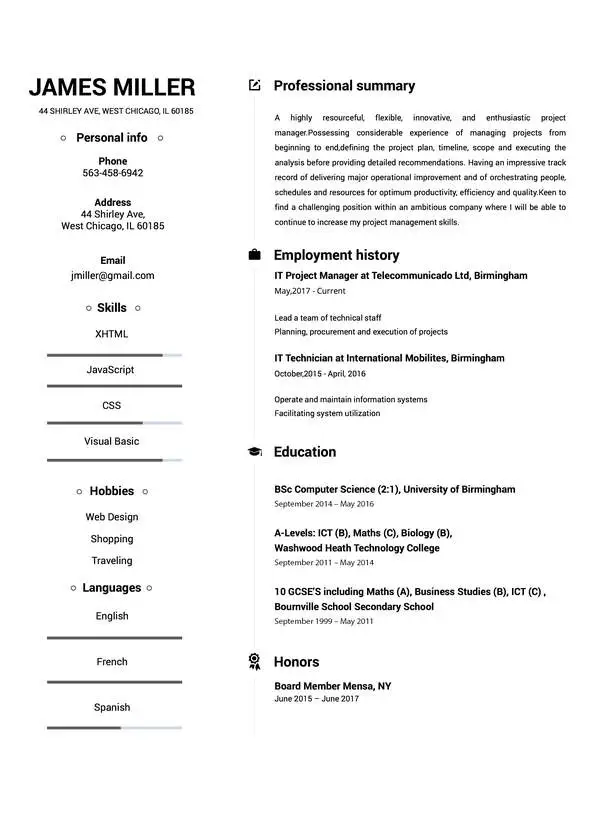 Use This Template
Use This Template
Build your resume in 15 minutes
Create an awesome resume that meets the expectations of potential employers with our selection of professional, field-tested resume templates.
bartender: Resume Samples & Writing Guide
Professional Summary
Employment history
- Check identification of customers to verify age requirements for purchase of alcohol
- Answer customer questions about drinks, food, and other restaurant services
- Monitor guests to ensure they do not become overly intoxicated
- Greet and serve guests in a friendly and professional manner
- Check identification of customers to verify age requirements for purchase of alcohol
- Prepare garnishes for drinks
- Prepare garnishes for drinks
- Provide excellent customer service
- Ring up drinks and collect payment
Education
Skills
Do you already have a resume? Use our PDF converter and edit your resume.
Professional Summary
Employment history
- Prepare garnishes for drinks
- Adhere to all state and local liquor laws
- Check identification of customers to verify age requirements for purchase of alcohol
- Follow all health and safety regulations
- Answer customer questions about drinks, food, and other restaurant services
- Prepare and serve alcoholic and non-alcoholic drinks according to standard recipes
- Monitor guests to ensure they do not become overly intoxicated
- Follow all health and safety regulations
- Check identification of customers to verify age requirements for purchase of alcohol
Education
Skills
Employment history
- Ring up drinks and collect payment
- Stock and restock bar with supplies such as ice, glasses, and liquor
- Maintain cleanliness of bar area and service stations
- Ring up drinks and collect payment
- Answer customer questions about drinks, food, and other restaurant services
- Check identification of customers to verify age requirements for purchase of alcohol
- Stock and restock bar with supplies such as ice, glasses, and liquor
- Prepare and serve alcoholic and non-alcoholic drinks according to standard recipes
- Clean and sanitize work areas
Education
Skills
Professional Summary
Employment history
- Answer customer questions about drinks, food, and other restaurant services
- Check identification of customers to verify age requirements for purchase of alcohol
- Take drink orders from serving staff or directly from patrons
- Provide excellent customer service
- Follow all health and safety regulations
- Stock and restock bar with supplies such as ice, glasses, and liquor
- Answer customer questions about drinks, food, and other restaurant services
- Adhere to all state and local liquor laws
- Follow all health and safety regulations
Education
Skills
Employment history
- Check identification of customers to verify age requirements for purchase of alcohol
- Follow all health and safety regulations
- Answer customer questions about drinks, food, and other restaurant services
Education
Skills
Not in love with this template? Browse our full library of resume templates
If you’re on the search for a new bartending job, you’ll need to re-write your resume. And in order to be a strong applicant, you need to do more than just list your previous places of employment.
Writing a great resume is like concocting a great cocktail. It’s equal parts art and equal parts science. You can’t just throw it together and hope for the best (although that’s certainly what some people do). If you don’t take your time with the resume, it’ll be tough to land a job, much less even get called in for an interview.
In this article, we’ll cover what it takes to create a bar manager-approved resume. After reading this resume-writing guide, you’ll know:
- Which resume sections a bartender resume should include
- How to format your resume
- How to write a unique resume objective
- How to highlight your bartending achievements
- Which skills you should mention on your resume
- How to make your resume stand out
- How to write a bartender resume if you have little or no experience
- Which bartending certifications can make you a more competitive candidate
Pretty helpful, right? You’ll be on your way to interviewing in no time at all.
But first, let’s look at some award-winning resume template examples. Resume templates can be a quick and effective way to create a resume that stands out from other papers in the pile. They’re easy to use and follow industry guidelines and best practices.
Multiple bartender resume template examples
How to write an eye-catching bartender resume
You might think that the hospitality industry is all about who you know. And in some cases, that may be true. But more times than not, bar managers don’t just hire their friends or family. They hire outside applicants that they believe are best suited for the job.
So you need a resume that shows why you’re the right fit. You might be surprised to hear this, but restaurant managers and owners look at resumes incredibly closely. Because if they don’t hire good bartenders or servers, customers won’t be happy. They won’t come back and they’ll tell their friends about the bad experiences they had. They may even go so far as to write a bad review online. And that’s just bad for business.
To write an eye-catching resume, you need to understand the importance of proper resume formatting.
How to format it
Resume formatting is incredibly important. But there’s a lot of conflicting information on the internet about formatting rules. Unfortunately, a lot of it is outdated. But luckily for you, ours isn’t.
When writing your resume, keep it to one page in length, with one-inch margins, and a font size that is easily readable. Typically this will be between 8-12 point font. But remember to view it at 100% zoom level to be sure.
Though it might be tempting to write your resume in Microsoft Word or Google Docs, we strongly, strongly advise against it. Your design abilities will be severely limited and formatting is difficult.
Instead, opt to use a professionally-designed resume template or an online resume builder. The formatting is already done for you and they save you a ton of time, since you aren’t creating anything from scratch.
Once you have a resume template picked out, you’ll want to start adding in content. When it comes to resumes, it’s best to keep things concise.
When restaurant owners first review resumes, they simply skim them. They don’t have time to read every resume word-for-word. Expecting them to do so is naive. And if your resume is filled with big text blocks, it’s hard to quickly gather any information and they probably won’t take the time to try and digest it all.
Instead, be sure to use brief statements and incorporate short bullet points or lists wherever possible. Using different font sizes, bold, and italics to break up different sections and section headers can also help.
If you’re wondering which sections to add to your resume, a safe bet is to include a header, summary, experience, skills, and education, at the very least.
In your header section, you’ll list your first, last name and contact information. Your name should be the biggest thing on your resume. You want to be remembered, right?
Under your name, add your phone number and email address. Hyperlink these if possible so that they’re easily clickable. Listing your home address isn’t necessary. In fact, it could even prevent you from being considered if you live far away (even though this is illegal).
Under your header, you’ll want to include a summary or objective section. Try to be as specific as possible in this section. Include a few sentences about your previous experience and your most notable achievements.
Below that, you’ll list your relevant job experience. Here, you’ll want to include any restaurant or event you’ve worked, even if you served, rather than bartended. List your experience in reverse-chronological order. Meaning, that you start with most recent position first and then work your way backward.
If your most recent experience isn’t related to the job you’re applying to, you can consider listing in order of relevance instead. Just be sure to include the dates you’ve worked at each position.
In the experience section, be sure to use action verbs that are more creative than just “responsible for” or “in charge of”.
In the skills section, be sure to cross-reference your top skills with the required skills from the job posting. You can include both soft and hard skills on your resume.
Finally, you’ll want to include an education section, with your highest level of education to date. You don’t need to include graduation dates – that’s an outdated requirement that isn’t necessary anymore.
Those are the basics of resume formatting. From there, restaurant managers will look for specific things on your resume to see if you’re a good fit for the position.
What restaurant and bar managers will look for on your resume
Restaurant managers want to look for bartenders who are experienced, who thrive in fast-paced environments, and also ones who can stay level-headed in stressful situations.
They’ll look for someone with these qualities when reviewing resumes. So how do you best demonstrate them? Firstly, you’ll want to mention more than just list typical bartending responsibilities on your resume.
It’s tempting to do this, but it doesn’t really give any insight to your bartending abilities. Instead, include information about how many customers you serve at a time, how you upsell, and which ways you leverage your interpersonal skills.
Those kinds of additions to your resume showcase your capabilities much more.
Bar managers also want to get a sense of what kind of bars you’ve worked in and which types of clientele you have experience working with. Someone whose previous bartending experience includes working at a crowded college bar probably won’t do well at a high-end restaurant.
They’ll also try to gauge how knowledgeable you are about different types of alcohol. It’s no secret there’s a lot to know. Between spirits, wine, and beer, there’s a lot to remember.
If you’re a bartender with only a little bit of experience, bar managers will look for additional work experience in the hospitality field. This could include serving experience, working as a caterer, or even working as a host/hostess.
Another thing bar managers will look for in a possible new hire is whether or not they have an alcohol server certification.
Why mentioning alcohol server certification is important for this job and how to do it correctly
Many states require a mandatory alcohol server certification in order for you to be able to serve, mix, or sell alcohol. If this is a certification you already have, you should be sure to include it on your resume.
Even if it might seem like a no-brainer, it’s better to add it than to leave a bar manager wondering. You can either create a section for certifications you hold or include it under your name in your resume header.
How to list additional certifications, languages, and hobbies
In addition to a header, summary, experience, skills, and education section, you can also add a section that talks about what you do outside of work.
Many people will label this section as “interests.” Try to keep anything you add here related to bartending or service-related skills. For example, if you take stand-up classes, that shows you have a good sense of humor and can deal with difficult customers in a light-hearted way.
If you are into Crossfit, that shows you’re a hard worker with exceptional discipline.
What skills to mention and how to do it correctly
Skills are incredibly important to mention on your resume. You should mention both interpersonal, soft skills as well as bartending-specific technical skills. Here are some of the top sought-after bartending skills to add to your resume:
- Attentiveness
- Liquor laws
- Memory
- Math
- Active listening
- Multitasking
- Inventory ordering and management
- Customer service
- Sense of humor
- Upselling
- Cleanliness
- Signature cocktails
- Outgoing
- Intervention protocols
- Wine and food pairings
- Engaging
- Patience
- Assertiveness
- Mixology
- Spirits
- Tourism knowledge
- Understanding of allergies and food sensitivities
- Knowledge of alcoholic and non-alcoholic drinks
You can list your skills in a bullet list on your resume. If there are any instances that come to mind that demonstrate you using your skills in action, those can also be helpful to add to your resume.
For soft skills especially, they tend to mean more when you can back them up with an example. Think about how interviews work. They’ll often ask you to talk about a time you dealt with a difficult customer. Instead of just saying you used your problem-solving skills, it means more when you break things down to describe *how* you used your problem-solving skills.
How to highlight your achievements
Highlighting achievements is one of the most important things you need to do to write a great resume.
We touched on this earlier, but simply listing basic bartending responsibilities won’t get you far. Instead, highlight what you have achieved in your previous positions. Did you mix a new drink that led to a significant increase in sales? Add it to your resume.
Did you take on extra responsibility when a coworker called in sick? Include it on your resume. The more you can do this, the better off your resume will be.
Were you promoted to shift manager? It better be somewhere on your resume.
How to write a resume objective and examples of this
A resume objective is your chance to make a good first impression. In just a few sentences, you need to show what you want to bring to the job you’re applying for. Here is an example of the wrong and the right way to write a resume objective.
Wrong resume objective: Experienced bartender with 7 years of experience serving a wide variety of customers. Hoping to bring my skills and knowledge to a bar in downtown Boston.
This resume objective is pretty bland. It’s filled with generic statements and doesn’t mention any specific goals.
Right resume objective: Bartender with 7 years of experience working in fine dining establishments. I am well versed in crafting cocktails, planning menus, and pairing wines. I want to bring my energetic and outgoing personality to add to the atmosphere of a bar in downtown Boston.
This resume objective is more specific and goes into greater detail about the candidate’s past experience.
How to write a resume summary and examples of this
A resume summary, on the other hand, focuses solely on past experience. You’ll still want to focus on achievements but you don’t need to talk about any future goals or career aspirations.
Wrong resume summary: Bartender with 5 years of experience mixing and serving a variety of beverages.
This resume summary is pretty vague. Try to be more specific.
Right resume summary: Bartender with 5 years of experience mixing and serving cocktails, beer, and wine. I serve drinks quickly and accurately and thrive in fast-paced environments.
How to write a bartender resume when you have limited or no experience
If you have limited or no bartending experience, that doesn’t mean it’s impossible to get a job. You’ll just have to spend a little extra time on your resume to show why you’re the right fit for the position.
Remember that bartending can be a competitive field. So get creative about the ways you showcase your skills and experience.
Be sure to include any restaurant or bar experience you have, even if they weren’t bartending positions. Servers and bouncers have many of the same skills needed to succeed as a bartender.
Try to tweak your bullet points for each previous position to relate them to what a bartender does.
And never underestimate the importance of showing willingness to learn. Every job requires some learning and bar managers as well as owners appreciate someone who wants to proactively increase their knowledge.
How to make your resume stand out
If your resume doesn’t stand out, your chances of getting called in for an interview are slim to none. And the last thing you want to do is spend all this time rewriting your resume only to have it end up in the trash.
To prevent that from happening, there are a few things you can do to ensure your resume stands out.
Edit it for every job: Unfortunately, resumes are not a one-size-fits-all document. It might seem like your resume will work as-is for every job you apply to, but that couldn’t be further from the truth.
For every job you apply to, you need to make edits and adjustments. What kind of edits are we talking about? Well, your best bet is to tweak each application to the job description. Are there certain skills they’re looking for in a candidate? Be sure to include them on your resume.
Revise, revise, revise: It will likely take a few revisions until you feel like your resume is ready to be sent off. And even then, you need to proofread your resume at least twice. Typos happen more frequently than we’d all care to admit. And through all the revisions, it’s easy to miss them.
Once you feel like your resume is ready to go, comb through it closely. Printing it out can help you catch errors you might miss if you just look it over on your computer. It also doesn’t hurt to have a friend or family member read it over too.
When it comes to resume writing, you can never be too careful. After putting so much time into perfecting it, it’s easy for your eyes to see what they want to see.
Add a splash of color: Adding color to your resume used to be a big no-no. But times have changed. Now, you get a little more creative freedom when designing your resume. And adding color to it can help you stand out.
Use it to help draw attention to your resume, but be careful that it doesn’t distract. You’ll want to avoid overusing a color or using any especially bright colors.
Describe accomplishments, not responsibilities: This is one of the most common mistakes applicants make. Your experience section isn’t meant to describe what you do. It’s meant to describe how well you do it.
It’s not enough to say you serve cocktails to customers. That’s what your job requires. The questions should be, “Are you good at it?” Or do you mess up orders and forget ingredients?
Everyone knows what a bartender does. Instead, focus on the things you succeed at and the ways you go above and beyond.
Quantity for accomplishments: Adding accomplishments to your resume is great, but quantifying them is even better. Using numbers helps increase your credibility and better describes your capabilities.
How much do you typically generate in alcohol sales a month? How much money did you help save your bar from proper measuring and pouring? What new drinks did you offer to help get people in the door and how much revenue did they generate?
Don’t add irrelevant information: The things you leave off your resume are just as important as the things you include on it. Simply adding things for the sake of adding them is never a good idea. It will only make it that much more difficult for a hiring manager to find your relevant skills and experience.
Use power verbs: Most resume bullet points start with the same old boring words. And quite frankly, people get sick of reading them.
To stand out, try to get a little more creative. Switch out common, overused verbs with power verbs that are more compelling and descriptive.
The wrong way to use verbs: Coordinated new happy hour drink menu
The right way to use verbs: Spear-headed new happy hour drink menu and pricing
Instead of starting with “led”, try using “coordinated,” “executed,” “oversaw,” “orchestrated,” or “spear-headed.”
To show that you saved your bar money, try using power verbs such as “reconciled,” “reduced,” “consolidated,” or “yielded.”
To show you increased customer satisfaction, try using “boosted,” “maximized,” or “amplified.”
To demonstrate ways you improved something at work, try using “refined,” “overhauled,” “restructured,” “streamlined,” or “strengthened.”
Using power verbs like these mean a lot more than their overused counterparts.
How Resumebuild.com resume builder tool could be utilized for an easy resume setup
As you can see, writing a great bartender resume is no easy feat. It takes a lot of time and effort. Luckily, there are resume builder tools that can be used for fast and easy resume set up.
Here at Resume Build, we create custom resumes that are HR-approved and designed with you in mind. Thanks to our advanced resume building technology, you can effortlessly craft your resume in just a few minutes.
And if you’re really struggling with where to get started, we have pre-written resume examples so you don’t have to start from scratch.
Just choose your resume template, upload your content (or use one of our pre-written examples), and download your tailored-built resume. It’s as easy as one-two-three.
Start investing in your future and try our one-of-a-kind online resume builder today.
bartender Job Descriptions; Explained
If you're applying for an bartender position, it's important to tailor your resume to the specific job requirements in order to differentiate yourself from other candidates. Including accurate and relevant information that directly aligns with the job description can greatly increase your chances of securing an interview with potential employers.
When crafting your resume, be sure to use action verbs and a clear, concise format to highlight your relevant skills and experience. Remember, the job description is your first opportunity to make an impression on recruiters, so pay close attention to the details and make sure you're presenting yourself in the best possible light.
bartender
- Prepared beverages for bar and resturant patrons
- Assesed customers needs and preferneces and made reccomendations
- Upsold drink items to customers
- Worked in a very fast paced environment
bartender
- Take orders from customers for food or beverages.
- Check identification of customers to verify age requirements for purchase of alcohol.
- Collect money for drinks served.
- Stock bar with beer, wine, liquor, and related supplies such as ice, glassware, napkins, or straws.
bartender
- Present menus to patrons and answer questions about menu items, making recommendations upon request..
- Strong team member working to prepare appetizers, entrees, salads, and alcoholic beverages
- Perform some food preparation or service tasks such as cooking, clearing tables, and serving food and drinks
- Ability to manually calculate and split bills,
bartender
- Obtained orders and served drink to customers
- Receive and handled cash
- Created new drink options
- Managed a portion of advertising
bartender
- Meeted and greeted hundreds of new guests daily.
- Assisted bar customers’ needs and preferences and often made recommendations.
- Prepared alcoholic and non alcoholic drinks for bar and patrons.
- Interacted with customers and assuring they have a pleasant experience.
bartender Job Skills
For an bartender position, your job skills are a key factor in demonstrating your value to the company and showing recruiters that you're the ight fit for the role. It's important to be specific when highlighting your skills and ensure that they are directly aligned with the job requirements, as this can greatly improve your chances of being hired. By showcasing your relevant skills and experience, you can make a compelling case for why you're the best candidate for the job.
How to include technical skills in your resume:
Technical skills are a set of specialized abilities and knowledge required to perform a particular job
effectively. Some examples of technical skills are data analysis, project management, software proficiency,
and programming languages, to name a few.
Add the technical skills that will get hired in your career
field with our simple-to-use resume builder. Select your desired resume template, once you reach the skills
section of the builder, manually write in the skill or simply click on "Add more skills". This will
automatically generate the best skills for your career field, choose your skill level, and hit "Save &
Next."
- Alcohol Knowledge
- Cash Handling
- Point of Sale Systems
- Menu Knowledge
- Cocktail Preparation
- Beverage Preparation
- Food Safety
- Food Handling
- Menu Creation
- Inventory Management
- Customer Service
- Sanitation
- Cleaning
- Bartending Techniques
- Mixology
- Alcohol Safety
- Bar Maintenance
- Alcohol Laws
- Wine Knowledge
- Upselling Techniques
- Bartender Certification.
How to include soft skills in your resume:
Soft skills are non-technical skills that relate to how you work and that can be used in any job. Including
soft skills such as time management, creative thinking, teamwork, and conflict resolution demonstrate your
problem-solving abilities and show that you navigate challenges and changes in the workplace
efficiently.
Add competitive soft skills to make your resume stand-out to recruiters! Simply select
your preferred resume template in the skills section, enter the skills manually or use the "Add more skills"
option. Our resume builder will generate the most relevant soft skills for your career path. Choose your
proficiency level for each skill, and then click "Save & Next" to proceed to the next section.
- Communication
- Interpersonal
- Leadership
- Time Management
- Problem Solving
- Decision Making
- Critical Thinking
- Creativity
- Adaptability
- Teamwork
- Organization
- Planning
- Public Speaking
- Negotiation
- Conflict Resolution
- Research
- Analytical
- Attention to Detail
- Self-Motivation
- Stress Management
- Collaboration
- Coaching
- Mentoring
- Listening
- Networking
- Strategic Thinking
- Negotiation
- Emotional Intelligence
- Adaptability
- Flexibility
- Reliability
- Professionalism
- Computer Literacy
- Technical
- Data Analysis
- Project Management
- Customer Service
- Presentation
- Written Communication
- Social Media
- Troubleshooting
- Quality Assurance
- Collaboration
- Supervisory
- Risk Management
- Database Management
- Training
- Innovation
- Documentation
- Accounting
- Financial Management
- Visualization
- Reporting
- Business Acumen
- Process Improvement
- Documentation
- Relationship Management.
How to Improve Your bartender Resume
Navigating resume pitfalls can mean the difference between landing an interview or not. Missing job descriptions or unexplained work history gaps can cause recruiters to hesitate. Let's not even talk about the impact of bad grammar, and forgetting your contact info could leave your potential employer hanging. Aim to be comprehensive, concise, and accurate.
Employment history
- Provide excellent customer service
- Balance cash drawers at the end of shifts
- Follow all health and safety regulations
- Balance cash drawers at the end of shifts
- Prepare garnishes for drinks
- Monitor guests to ensure they do not become overly intoxicated
- Clean and sanitize work areas
- Provide excellent customer service
- Stock and restock bar with supplies such as ice, glasses, and liquor
Education
Skills
Provide your Contact Information and Address Year Gaps
Always explain any gaps in your work history to your advantage.
Key Insights- Employers want to know what you've accomplished, so make sure to explain any gaps using a professional summary.
- Adding extra details and context to explain why you have a gap in your work history shows employers you are a good fit for the position.
How to Optimize Your bartender Resume
Keep an eye out for these resume traps. Neglecting to detail your job roles or explain gaps in your career can lead to unnecessary doubts. Grammar blunders can reflect negatively on you, and without contact information, how can employers reach you? Be meticulous and complete.
Employment history
- Rung up drinks and collect payment
- Clean and sanitise work areas
- Adhear to all state and locals liquor laws
- Moniter guests too ensure they don't become overly intoxicated
- Stock and restock bar with supples such as ice, glases, and liquor
- Adhear to all state and local liquer laws
- "I went to the store to get some food.
- I went to the store to get some foods.
Education
Skills
Include Job Descriptions and Avoid Bad Grammar
Avoid sending a wrong first impression by proofreading your resume.
Key Insights- Spelling and typos are the most common mistakes recruiters see in resumes and by simply avoiding them you can move ahead on the hiring process.
- Before submitting your resume, double check to avoid typos.
bartender Cover Letter Example
A cover letter can be a valuable addition to your job application when applying for an bartender position. Cover letters provide a concise summary of your qualifications, skills, and experience, also it also gives you an opportunity to explain why you're the best fit for the job. Crafting a cover letter that showcases your relevant experience and enthusiasm for the Accounts Payable role can significantly improve your chances of securing an interview.
Hyatt Hotels Corporation
Chicago, Illinois
Esteemed Recruitment Team
I am a highly motivated Bartender with 14 years of experience in Hospitality. I am excited to submit my application for the Chief Bartender position at Hyatt Hotels Corporation, where I believe my skills and expertise would be an excellent fit.
Throughout my life, I have been passionate about Hospitality Design and have pursued opportunities to make a difference in this field. My experience in various areas, not just in Hospitality, has given me the opportunity to develop my skills in Troubleshooting and Interpersonal, which I am excited to apply to the role at Hyatt Hotels Corporation. I am eager to work with a team that shares my values and to help your organization achieve its well determined goals.
I am elated about the opportunity to join a team that shares my passion for this field, and values collaboration and innovation. I am confident that together we can overcome whatever tests and challenges are put on our way.
Cordially,
Xaviero Roberts
923-725-3432
[email protected]
Xaviero Roberts
Showcase your most significant accomplishments and qualifications with this cover
letter.
Personalize this cover letter in just few minutes with our user-friendly tool!
Related Resumes & Cover Letters
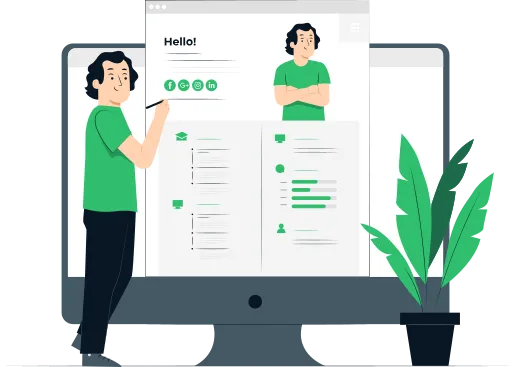
Build your Resume in 15 minutes
Create an awesome resume that meets the expectations of potential employers with our selection of professional, field-tested resume templates.

